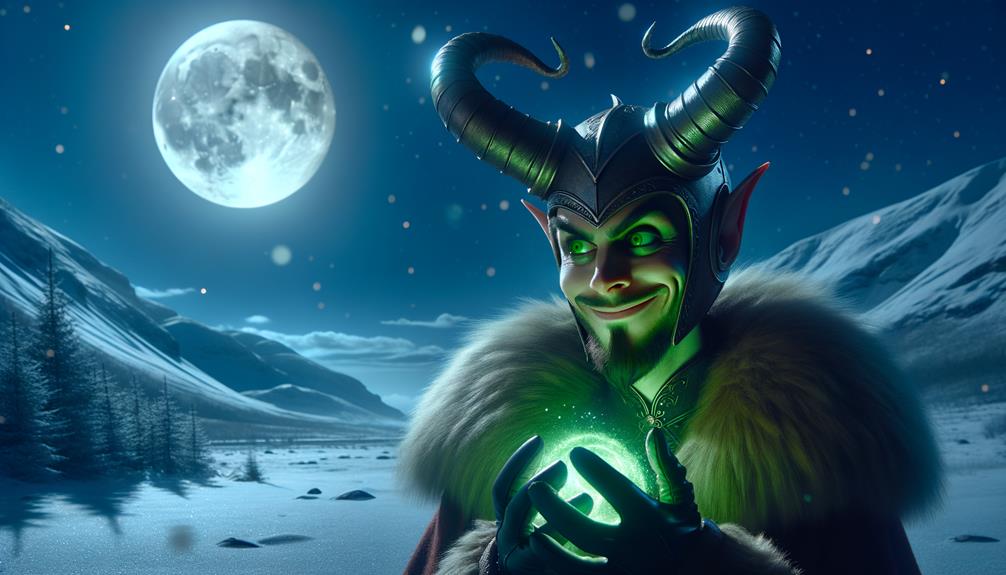The phrase, 'Still waters run deep,' perfectly captures the character of Loki, the elusive Norse God of Mischief. Loki is an enigma, a whirlpool of contradictions, playing both friend and foe in the stories of Norse mythology. While he's known for his unpredictable behavior and knack for stirring up trouble, it's also his sharp mind, shape-shifting powers, and impressive problem-solving skills that make him a valuable member of the godly group he hangs out with. However, his part in Ragnarök – the predicted apocalypse – brings up a host of questions about his real loyalties and intentions. So, who exactly is Loki, and what drives this crafty trickster god? It's hard to pinpoint these answers, but they could potentially offer insight into some of the most fascinating parts of Norse mythology.
Loki's Origin and Identity

Taking a closer look at Loki's identity and lineage reveals a fascinating character, born to Fárbauti and Laufey, and sibling to Helblindi and Býleistr. Loki stands out for his exceptional ability to change forms. Although Loki is a character from old Norse tales and part of the giant race, he's often thought of as Odin's son, which creates a complex dual identity.
Loki's role in Norse tales is both intriguing and deep. He's known as the god of mischief and his actions can be both helpful and hurtful. This contrast might stem from his dual heritage – being a giant's son and also seen as Odin's. This double heritage could be the reason behind his unpredictable and volatile nature.
In addition, his ability to change shape emphasizes his complex identity. Loki can become various creatures, from a simple fly to a mythical mare. This unique skill highlights his ever-changing and adaptable identity. It's also interesting that Loki is married to Sigyn and is the father of many distinctive and powerful beings. His children, like him, have significant roles in Norse tales, showing just how crucial Loki is to these ancient stories.
The Trickster's Mythical Powers
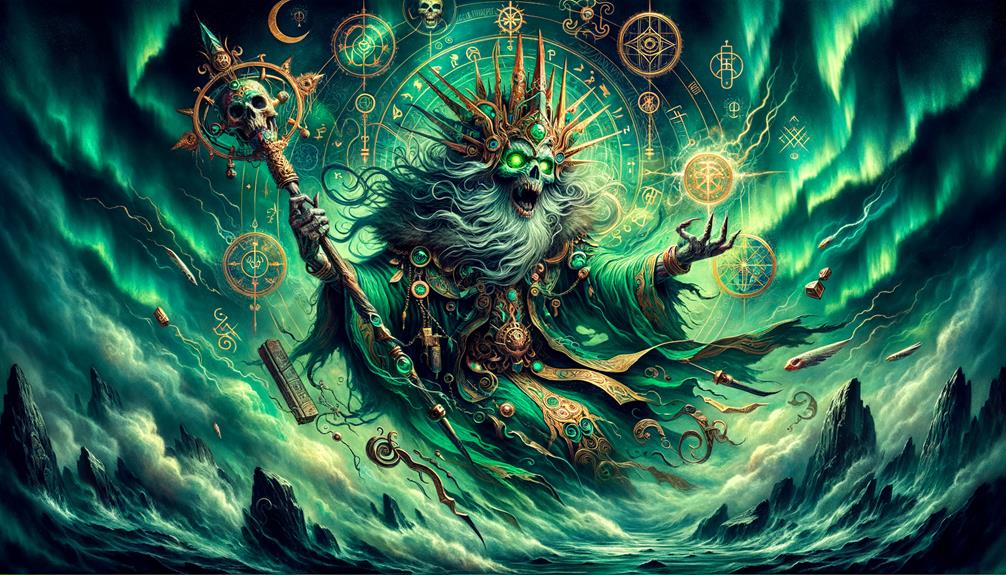
Let's chat about Loki and his mysterious powers. Loki, known for his trickery in Old Norse literature, had the amazing ability to change shapes. This wasn't just a party trick – it was part and parcel of who he was. He could become anything, from a fish to a horse, and there's even a chance he turned into an old woman at one point.
Loki's ability to change forms was not just for fun. He used it to his advantage, creating chaos and confusion amongst the other Norse gods. It was more than just a skill; it was a core part of his mystic abilities.
There's a famous story about Loki using his smarts and powers in a dangerous game. He fooled the blind god Hodr into killing his own brother, Baldr, with a mistletoe dart. And Loki's ability to change form wasn't limited to him. His three kids also had their own unique, and quite scary, abilities, which only made things more complicated for Loki and his relationship with the other gods.
Loki's Complex Family Relationships
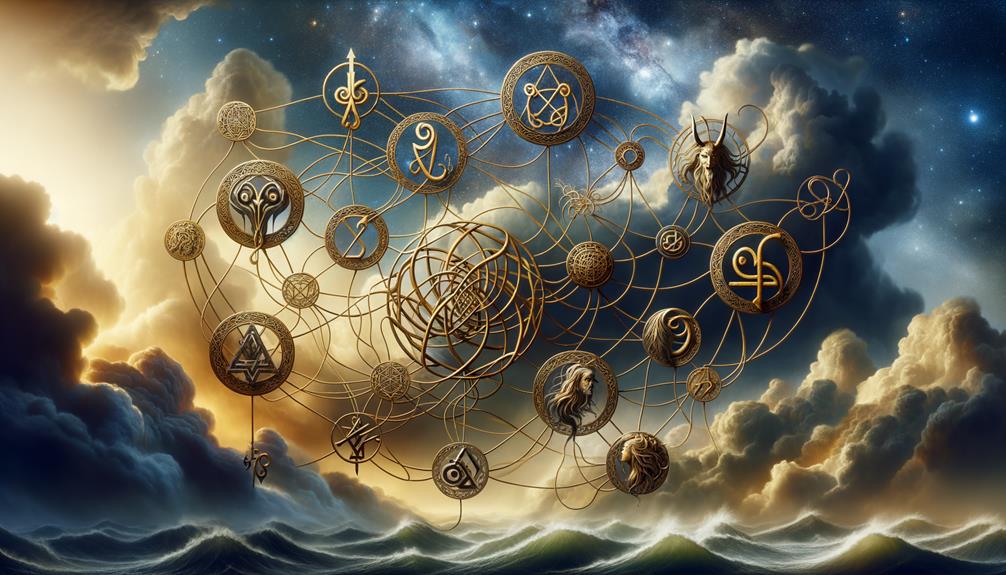
Let's chat about Loki's family. It's a complicated bunch, as one might expect from a trickster god. Loki is the child of Fárbauti and Laufey, but he doesn't exactly have a picture-perfect family life with them. His interactions with the Aesir, especially Thor, are even more tangled.
Loki's married to Sigyn and they have a couple of kids together. But Loki's lineage doesn't stop there. He's got other kids who aren't as well known as his notorious trio – Hel, who rules the underworld; Jörmungandr, the huge serpent that encircles the world; and Fenrir, the giant wolf. These three were born to the giantess Angrboda, and they're really important in the prophecy of Ragnarök, a significant event in Norse mythology.
Now, here's the weird part: Loki's also the mom of Sleipnir, an eight-legged horse that Odin rides. Yep, you heard that right – Loki gave birth to a horse. It's just another twist in the strange saga of Loki's family.
This family reflects Loki's own unpredictable character. His children, like him, have crucial roles in the universe. They often find themselves in a position where they're both helping and hindering the gods.
Symbolism and Representation of Loki
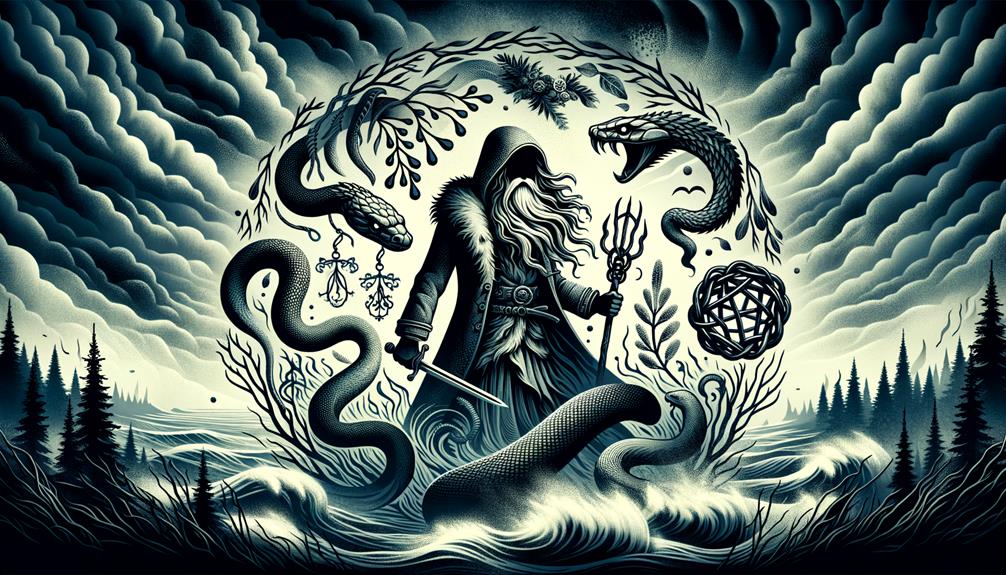
Let's chat about Loki, the fascinating Norse god, by looking at the many symbols and meanings tied to him. From his snake symbolism that mirrors his elusive personality and his son Jormungandr, to his vibrant red hair that hints at chaos and ruin. These symbols give us a unique window into the multifaceted nature of Loki – a character full of wit, disorder, and intricacies.
An important moment to note is the birth of Sleipnir, the eight-legged horse, a result of Loki's ability to change forms. This event emphasizes Loki's versatility and his disregard for usual conventions. Plus, remember when Loki stole Sif's hair and replaced it with golden strands? This episode underlines his cunning and dishonest ways, which often get him into sticky situations.
There was a point when Loki lost a bet and found himself restrained by his faithful wife, the goddess Sigyn. This act of discipline serves as a reminder of the fallout from his pranks. Loki, born from Laufey, is a figure brimming with complexity. His portrayal ranges from a symbol of destructive havoc to a misjudged outsider, showing us the erratic and disorderly side of life itself.
Loki's Influence in Modern Culture
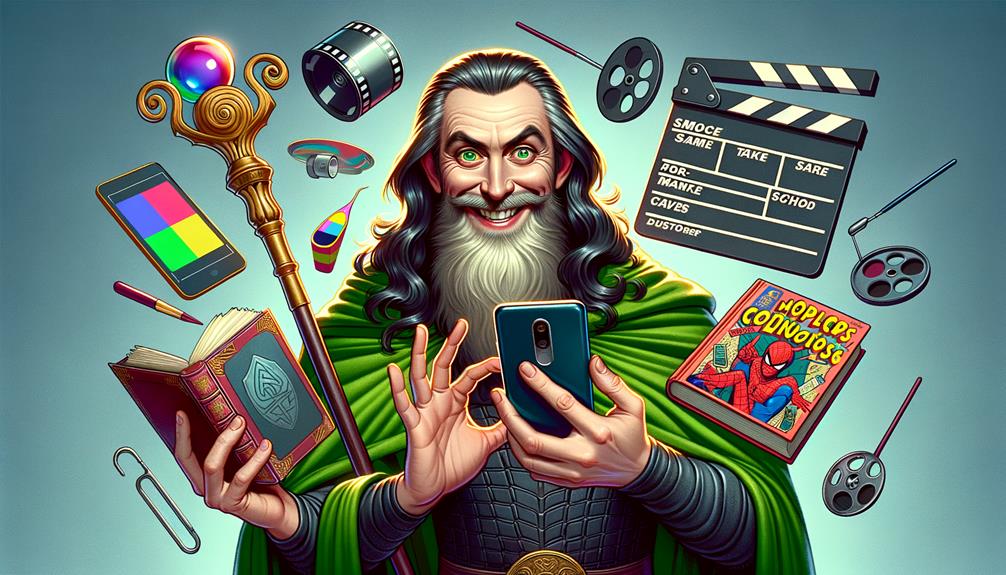
Loki, the Norse god of mischief, has roots that go way back to ancient mythology, but his influence isn't just limited to old tales. Nowadays, Loki's presence is felt strongly in our modern culture, spanning across books, movies, TV series, and even video games. Tom Hiddleston's portrayal of Loki in the Marvel Cinematic Universe is the most well-known and has had a far-reaching effect on pop culture.
The crafty and deceptive aspects of Loki's character, brought to life through his numerous schemes, have become a major part of his allure in today's media. Loki as a character is not just black or white, his moral greyness makes him a complex anti-hero that keeps audiences hooked.
Actors like Hiddleston who have played Loki, help us reflect on our own inner battles, the constant tug-of-war between what's right and wrong, and the dilemmas that can crop up from these.
You can't miss Loki's impact in today's culture, it's everywhere. From gripping tales centered around Loki's adventures to impressive fan art flooding social media platforms, Loki's presence is a constant reminder of his long-lasting appeal and importance.
Frequently Asked Questions
Is Loki the God of Mischief?
Absolutely, Loki carries the title of the God of Mischief in the tales of Norse mythology. He's widely celebrated for his craftiness, unpredictability, and the ability to shape-shift. Often, Loki is the mastermind behind the chaos that unfolds for both gods and mortals with his pranks.
Is Loki Evil or Mischievous?
Well, you know, Loki isn't exactly a force of outright evil – he's more like a trickster. He's always stirring the pot, causing a ruckus, and that often makes it hard to tell if he's just playing around or if he's got more sinister motives. But that's exactly what makes him such a captivating character in Norse mythology – you never know what he's going to do next!
What Are the Powers of the Norse God Loki?
Loki, the Norse God, has some pretty amazing powers up his sleeve. For starters, he's got the ability to change his form and turn into different animals. Cool, right? But that's not all. He's known for being incredibly crafty and mischievous, often stirring up trouble among the other gods with his clever plots.
Is Loki a Demon God?
So, you're wondering if Loki is a demon god? Well, he's not. In the lore of Norse mythology, Loki is a fascinating character who's best known for his tricks and the chaos he loves to stir up. He's not exactly an evil guy, though. He's more of a troublemaker than a demon. Another cool thing about Loki? He has the power to change his shape. Quite the interesting character, don't you think?

